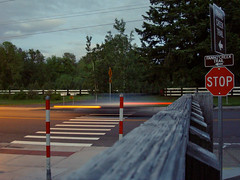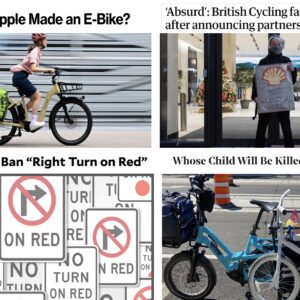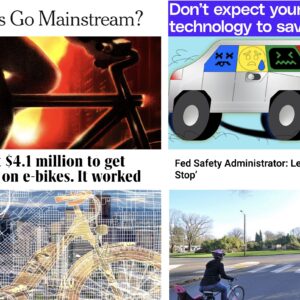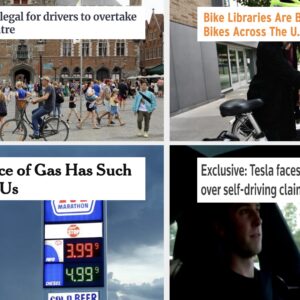
Here’s the news that caught our eyes this past week…
– A new study by the AAA says that Portland area traffic crashes cost us $2.74 Billion a year.
– Beginning February of 2012, Velocity will begin manufacturing aluminum bicycle rims in Jacksonville, Florida. The Austrailian company, which produces bicycle rims and accessories, will be the only company to manufacture aluminum rims in the United States.
– The Economist demonstrated why attacking Amtrak’s federal funding is the wrong issue to be fighting when the tax-payer subsidy for rail in the United States is already slightly less than that for roads, per each mile of travel.
– Just in time for the rainy weather, Caroline Paquette from Little Package Cycling Caps (a Portland-based company and BikeCraft vendor) has a guide on how to sew waterproof outerwear.
– There’s just one day left to submit your presentation ideas for Velo-City 2012. Proposals can be submitted on Velo-City 2012’s website.
– According to one author from the UK, instead of asking for people on bikes to pay a special tax, we would all be better off economically if we enticed people to get on their bikes with more tax breaks and incentives for riding.
– Are the suburbs a Ponzi Scheme? Business Insider goes into detail showing exactly why that may be true in areas where maintenance of existing infrastructure is being paid for by new growth built with private debt.
– Far from angry, a letter from the brother of a man who died during the Rapha Gentleman’s Ride focuses on the man’s love of bicycling.
– One determined group in Mexico City painted a 5km-long bike lane in just 8 hours with only about $1000 (USD) in funding. The bike lane leads up to a government building and is meant to show support for a proposal to dedicate 5% of the national transportation budget to bikes and pedestrians.
– Here are some helpful tips for motor vehicle drivers who want to avoid colliding with people on bicycles. Lest you think it’s is an anti-car rant, notice that the article comes from a car-centric blog. My favorite tip is their final piece of advice for drivers: “get on a bike!”
– A woman in Colorado has stolen back her own bike after finding it on Craiglist. After meeting the thief (and while taking it for a test ride to confirm it was her bike) she simply took the bike home, called police, and gave them the thief’s home address.
– Another stolen bike was recovered in Utah, this one with the help of police, but it probably wouldn’t have sold well on Craigslist anyway; the one-of-a-kind Trek belonged to seven-and-a-half foot tall former NBA center Shawn Bradley.
– The Seattle Transit Blog explains possible reasons why Proposition 1, a $60 Vehicle Licence fee, may have been doomed from the start despite its potential to raise money for improvements benefiting people in cars, in busses and trains, on bikes, and on foot.
– The New York Times gave a brief history of roads in the United States and how people who walk have been losing ground, to cars and to bicycles, for quite some time.
– And finally, here’s a breakdown of twelve “privileges” that one author believes some motor vehicle drivers feel they are entitled to.
Did you find something interesting that should be in next week’s Monday Roundup? Drop us a line.







Thanks for reading.
BikePortland has served this community with independent community journalism since 2005. We rely on subscriptions from readers like you to survive. Your financial support is vital in keeping this valuable resource alive and well.
Please subscribe today to strengthen and expand our work.
“Nationally, the financial damage of vehicle crashes is more than three times greater, nearly $300 billion versus the $97.7 billion cost of congestion, according to the auto club.”
another silver lining to the impending end of cheap oil, unburnable carbon…
“Nationally, the average cost of a fatal crash is $6 million and $126,000 for a serious injury crash, the study said.”
I wonder who pays those costs?
“In 2009, the Portland area had 120 traffic fatalities and 15,996 reported injuries, according to the study. The cost: $720 million for fatal crashes and more than $2 billion for injury crashes, according to the study. Based on population, the per-person cost of fatal and injury crashes in the region is $1,220, according to AAA.”
those are some amazing statistics. Thanks for linking to the article and report.
The 97 billion is for each crash
Somehow this statement seems as if it could apply to many things.
hmmmm
“Somehow this statement seems as if it could apply to many things.”
I’m not sure that I follow but I’d be interested if you want to expand on that statement. Or does the “hmmm” mean we should put on our own “thinking caps”?
See last week’s controversy.
caveat on the “helpful tips for motor vehicle drivers who want to avoid colliding with people on bicycles.”
This comes from the UK, where they drive on the OTHER side of the road.
Not that it really modifies any of the points.
Except for the left hook warning instead of a right hook warning. And that autos are automatically at-fault in Europe but not here.
Well…the Netherlands part of Europe apparently does that, which is a rather small part of Europe overall. I think London, or maybe all of England was thinking about taking the ‘driver is responsible unless proven otherwise.’ approach, but didn’t hear they had yet.
This is mainly from memory. Could be other countries that take that approach, but didn’t find them in a brief search.
Given the high cost of the car crashes, I’m sure Amanda Fritz will declare that there will be no more spending on car infrastructure until scofflaw drivers get their act together. I mean, that’s essentially what she said about bikes so of course she’ll be consistent.
True, and the TV news will be reporting that Scofflaw drivers are costing us big $$$$
Just learned of this bicyclist’s death on Highway 1 near Mendocino, CA. http://www.pressdemocrat.com/article/20111113/ARTICLES/111119784/1033/NEWS?Title=Hwy-1-bicyclist-struck-by-truck-airlifted-to-hospital